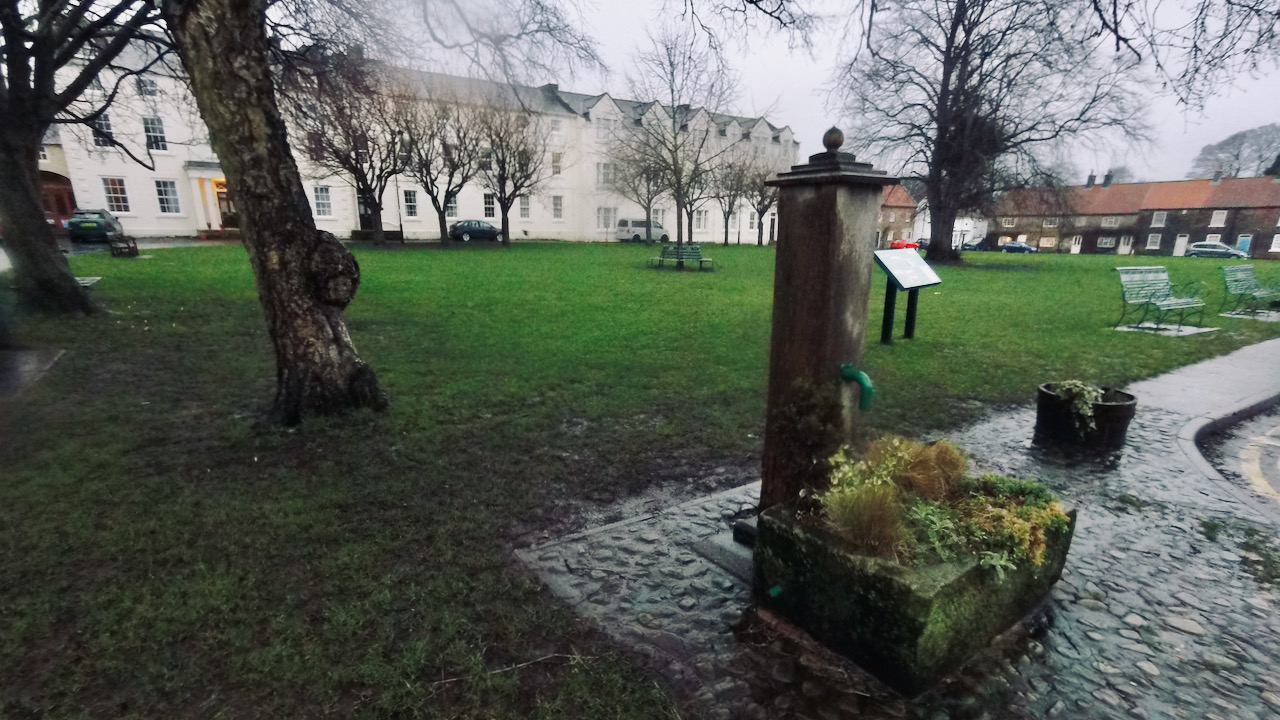Dominating Great Ayton’s soggy High Green, this soggy Monday morning is the stern façade of the erstwhile Friends’ School, now converted into residential dwellings. The village well, no longer in its original spot, was moved to make room for extra car-parking.
I recently read an account detailing the school’s arrangements in case of a prospective German invasion in the lead-up to World War One. The headmaster, Herbert Dennis, “was instructed to keep £100 in gold in the school safe; and various farms in Fryup were willing to accommodate the girls’ side; the boys could look after themselves.“1Watson, Alston G., “Ayton School, The Centenary History 1841-1941.” Page 129. Headley Brothers 1941.
It was not so much as the staggering sum of gold stashed away; rather, it was the genuine fear of a German invasion and the subsequent implementation of these preparations, which astonished me.
Evidently, a climate of invasion anxiety pervaded that era, with Great Britain and Germany ostensibly caught in a naval arms race. In the decade preceding the outbreak of the war, the Royal Navy’s confidence in thwarting an invasion of the British Isles declined. The naval top brass directed increasing efforts and resources to safeguarding our east coast, while newspaper columns speculated on the number of HMS Dreadnoughts required to fend off a potential German incursion. Even literary figures like H.G. Wells captivated readers with extraterrestrial attacks in his 1897 work, ‘The War of the Worlds,’ alongside others who envisioned French, German, or Russian invasions of Britain. The apprehension was pervasive and enthralling2OUPblog. 2017. ‘Invasion: Edwardian Britain’s Nightmare’, OUPblog <https://blog.oup.com/2017/09/invasion-fears-britain/> [accessed 29 January 2024].
The fear was so palpable that the Liberal Government disseminated extensive reports in an endeavour to allay public concerns. Here are the headlines from the Whitby Gazette in 19103‘The End of the Invasion Scare | Whitby Gazette | Friday 02 December 1910 | British Newspaper Archive’. 2024. Britishnewspaperarchive.co.uk <https://www.britishnewspaperarchive.co.uk/viewer/BL/0001103/19101202/200/0009?browse=False> [accessed 29 January 2024]:
The End of the Invasion Scare
PROOF THAT BRITAIN IS SAFE UNDER A LIBERAL GOVERNMENT
A Crushing Reply to the “Blue Funk” School
The term “blue funk,” originating in the 19th century, denotes a person or group gripped by intense fear or anxiety. Presumably, it served as a derogatory expression akin to “Project Fear” a century later.
Obviously, in hindsight, we know that neither the French, Germans, Russians, nor Martians seriously contemplated invading Britain between 1900 and 1914. Nevertheless, preparing for such an eventuality likely played a pivotal role in shaping the nation’s readiness for war.
I am left wondering just how the boys from the Friends’ School were meant to fend for themselves.
- 1Watson, Alston G., “Ayton School, The Centenary History 1841-1941.” Page 129. Headley Brothers 1941.
- 2OUPblog. 2017. ‘Invasion: Edwardian Britain’s Nightmare’, OUPblog <https://blog.oup.com/2017/09/invasion-fears-britain/> [accessed 29 January 2024]
- 3‘The End of the Invasion Scare | Whitby Gazette | Friday 02 December 1910 | British Newspaper Archive’. 2024. Britishnewspaperarchive.co.uk <https://www.britishnewspaperarchive.co.uk/viewer/BL/0001103/19101202/200/0009?browse=False> [accessed 29 January 2024]

Leave a Reply